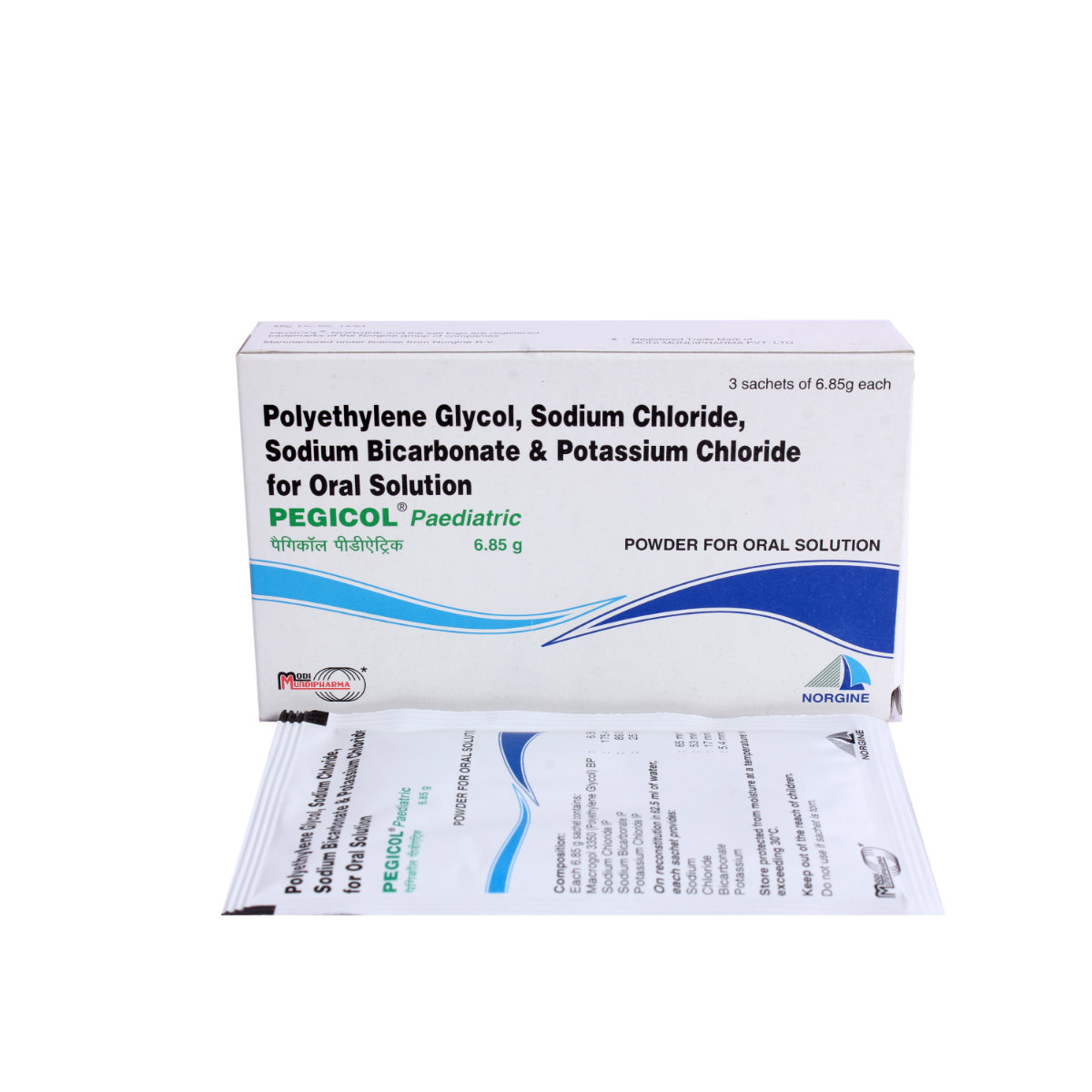Movicol Paediatric Sachet 6's
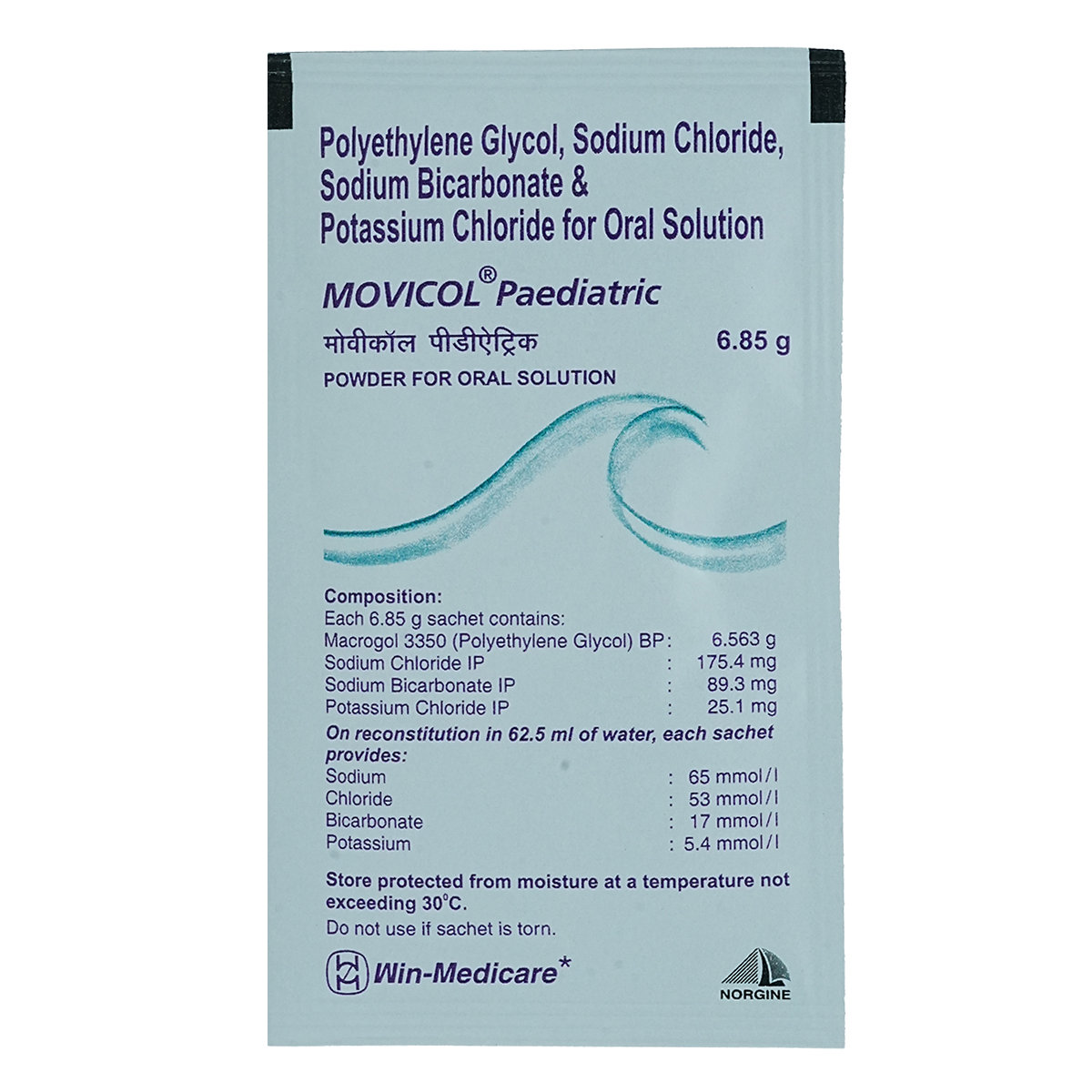
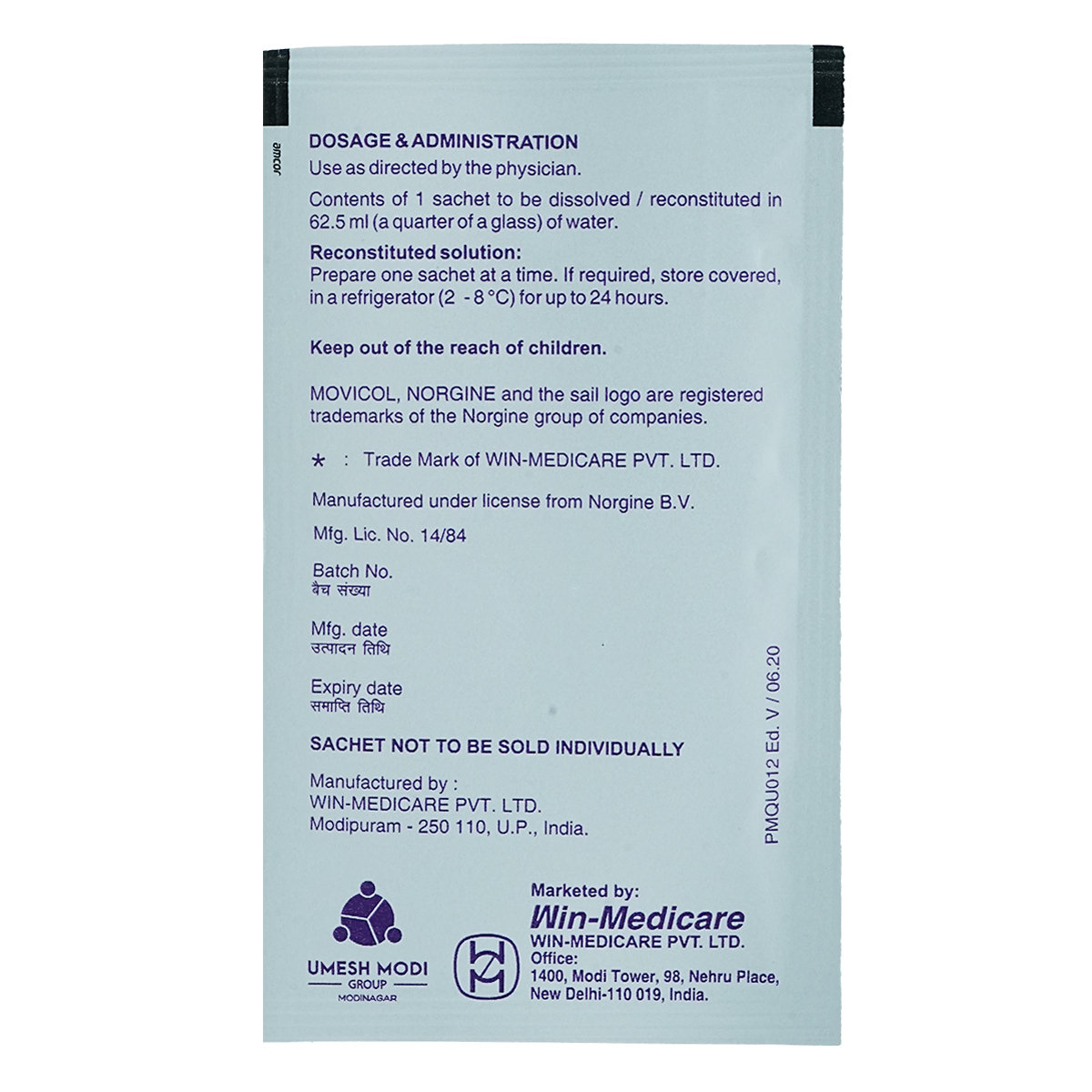
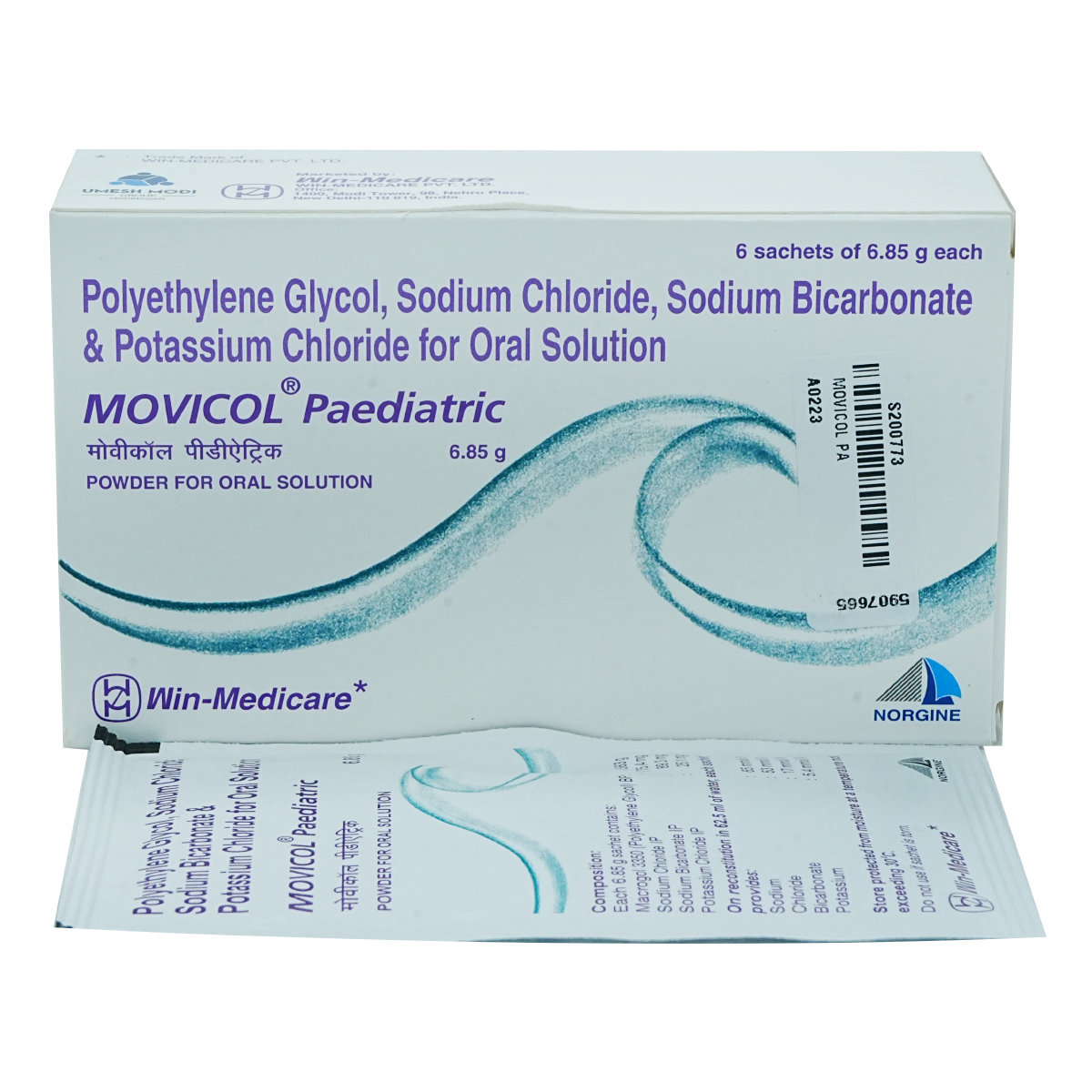
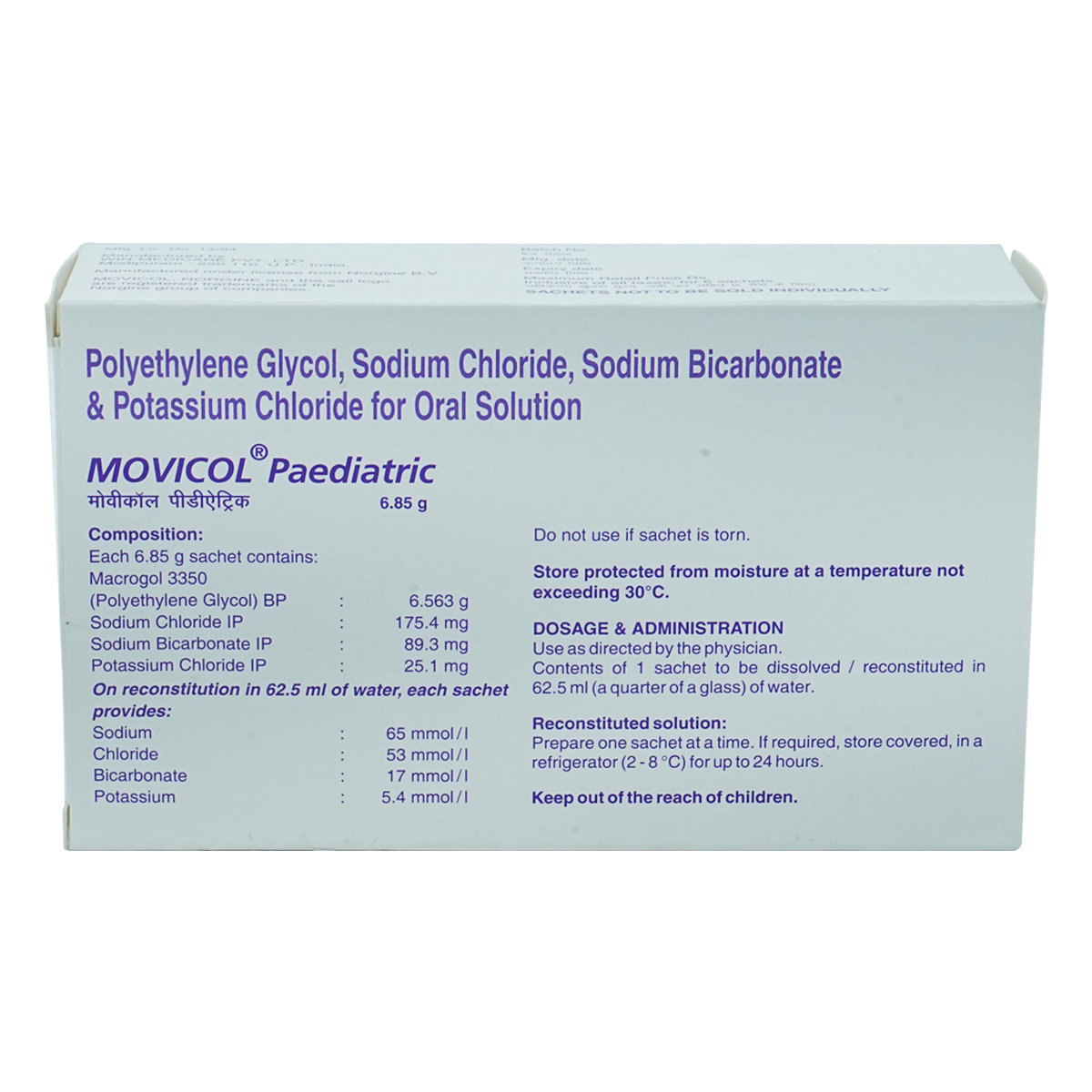
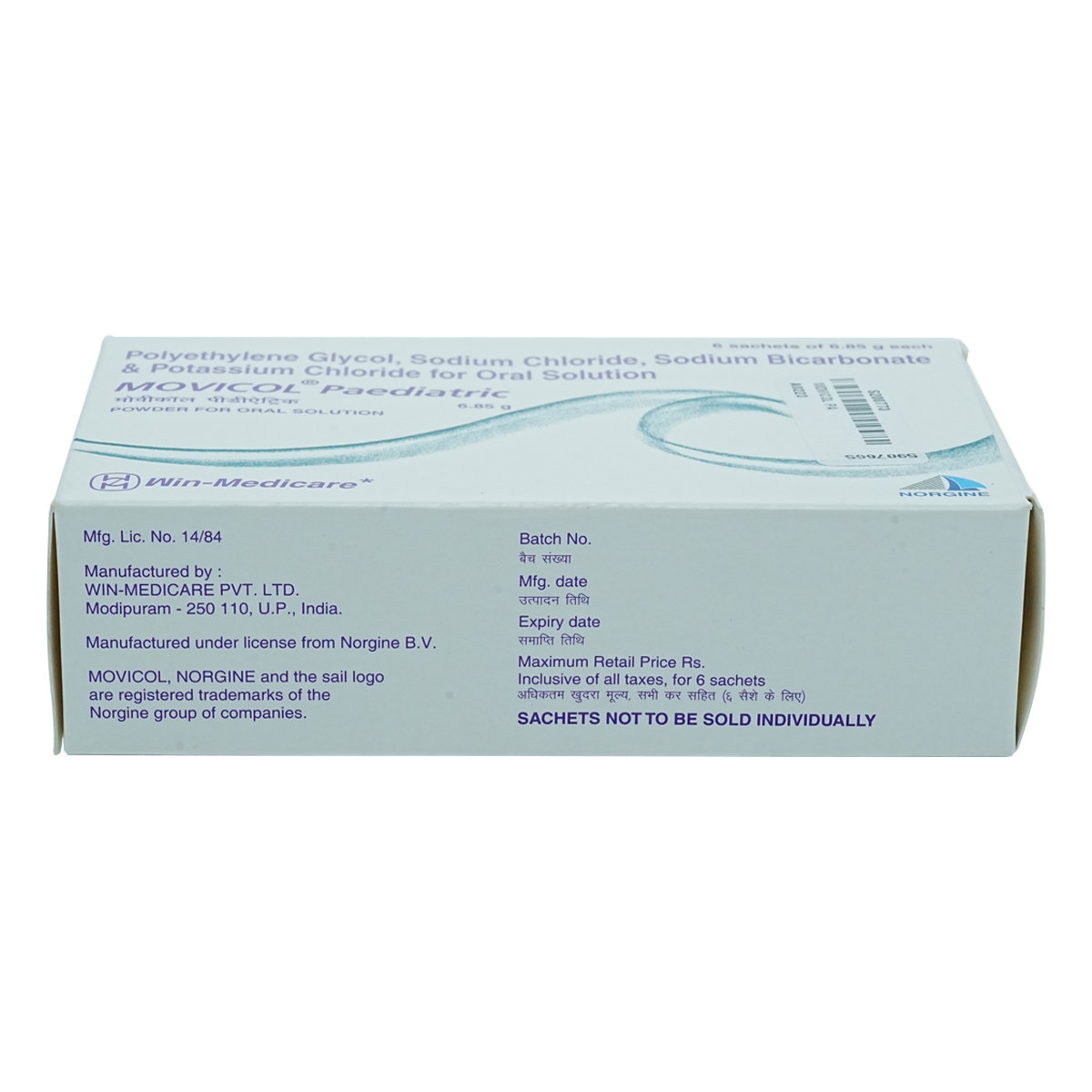

₹171
(Inclusive of all Taxes)
₹25.6 Cashback (15%)
Movicol Paediatric Sachet is used for bowel cleansing before colonoscopy in adults and pediatric patients aged 6 months or older. It works by inducing diarrhoea to effectively clear the bowel, ensuring optimal preparation for the procedure. In some cases, this medicine may cause side effects such as nausea, abdominal fullness, and bloating. Let the doctor know if you are pregnant, breastfeeding, taking other medicines or have pre-existing medical conditions.
Know Your Delivery Time
Provide Delivery Location

Secure Payment

India's Most Trusted Pharmacy

Genuine Products
Manufacturer/Marketer :
Consume Type :
Return Policy :
Expires on or after :
About Movicol Paediatric Sachet
Movicol Paediatric Sachet belongs to a class of drugs called laxatives, used for bowel cleansing prior to colonoscopy. Bowel cleansing prior to colonoscopy is the process of emptying the colon for a clear examination. It involves consuming a laxative solution that induces diarrhoea to remove stool and debris.
Movicol Paediatric Sachet contains polyethylene glycol, potassium chloride, sodium bicarbonate, and sodium chloride. It induces diarrhoea, which rapidly cleanses the bowel. It also helps maintain the electrolyte balance and prevents dehydration.
Take Movicol Paediatric Sachet as advised by your doctor. In some cases, you may experience side effects like nausea, abdominal fullness, and bloating. If the side effects persist or worsen, please consult your doctor.
Do not take Movicol Paediatric Sachet if you are allergic to any of its ingredients. Before taking Movicol Paediatric Sachet, inform your doctor if you have electrolyte imbalances, heart problems, seizures, kidney issues, or any gastrointestinal disease. If you are pregnant or breastfeeding, please consult a doctor before taking Movicol Paediatric Sachet. Movicol Paediatric Sachet can be used in pediatric patients aged 6 months or older, provided a doctor prescribes it.
Uses of Movicol Paediatric Sachet
Movicol Paediatric Sachet is used for bowel cleansing before colonoscopy. The detailed uses of Movicol Paediatric Sachet are as follows:
- Bowel cleansing: Movicol Paediatric Sachet cleanses the bowel before medical procedures or surgeries.
- Electrolyte balance: Movicol Paediatric Sachet restores electrolyte balance in the body.
- Dehydration treatment: Movicol Paediatric Sachet addresses dehydration or electrolyte imbalances.
Directions for Use
- For best results, no solid food should be consumed during the 3 to 4-hour period before drinking the solution. Avoid consuming solid foods within 2 hours of taking Movicol Paediatric Sachet.
- Follow your doctor's instructions on the dosage and timing of this medication.
- Check the label for directions and use as advised by the doctor. Add the contents into a container and reconstitute with lukewarm water up to the 4-litre fill line. Shake vigorously several times. Consume the contents as advised by the doctor.
- When reconstituted, use within 48 hours. Discard any unused portion.
Medicinal Benefits
Movicol Paediatric Sachet belongs to a class of drugs called laxatives, used for bowel cleansing before colonoscopy. Movicol Paediatric Sachet contains polyethylene glycol, potassium chloride, sodium bicarbonate, and sodium chloride. Polyethylene glycol works by drawing water into the intestines, softening stools, and promoting bowel movements. Potassium chloride, sodium chloride and sodium bicarbonate help maintain electrolyte balance and prevent dehydration.
How Movicol Paediatric Sachet Works
Storage
 97 people bought
97 people bought - Drink water or other clear fluids.
- To prevent worsening of pain, limit intake of tea, coffee, or alcohol.
- Include bland foods like rice, toast, crackers, and rice in your diet.
- Avoid lying down immediately after eating as it may cause indigestion or heartburn.
- Avoid acidic and spicy food as it may cause indigestion.
- Inform Your Doctor: Notify your doctor immediately about your diarrhoea symptoms. This allows them to adjust your medication or provide guidance on managing side effects.
- Stay Hydrated: Drink plenty of fluids to replace lost water and electrolytes. Choose water, clear broth, and electrolyte-rich drinks. Avoid carbonated or caffeinated beverages to effectively rehydrate your body.
- Follow a Bland Diet: Eat easy-to-digest foods to help firm up your stool and settle your stomach. Try incorporating bananas, rice, applesauce, toast, plain crackers, and boiled vegetables into your diet.
- Avoid Trigger Foods: Steer clear of foods that can worsen diarrhoea, such as spicy, fatty, or greasy foods, high-fibre foods, and dairy products (especially if you're lactose intolerant).
- Practice Good Hygiene: Maintain good hygiene to prevent the spread of infection. To stay healthy, wash your hands frequently, clean and disinfect surfaces regularly, and avoid exchanging personal belongings with others.
- Take Anti-Diarrheal Medications: If your doctor advises, anti-diarrheal medications such as loperamide might help manage diarrhoea symptoms. Always follow your doctor's directions.
- Keep track of your diarrhoea symptoms. If they don't get better or worse or are accompanied by severe stomach pain, blood, or dehydration signs (like extreme thirst or dark urine), seek medical help.
- Preventing Vomiting (Before it Happens)
- Take medication exactly as prescribed by your doctor. This can help minimize side effects, including vomiting.
- Having a small meal before taking your medication can help reduce nausea and vomiting.
- Talk to your doctor about taking anti-nausea medication along with your prescribed medication.
- Managing Vomiting (If it Happens)
- Try taking ginger in the form of tea, ale, or candy to help alleviate nausea and vomiting.
- What to Do if Vomiting Persists
- Consult your doctor if vomiting continues or worsens, consult the doctor for guidance on adjusting your medication or additional treatment.
- Inform your doctor about the nausea and discuss possible alternatives to the medication or adjustments to the dosage.
- Divide your daily food intake into smaller, more frequent meals to reduce nausea.
- Opt for bland, easily digestible foods like crackers, toast, plain rice, bananas, and applesauce.
- Avoid certain foods that can trigger nausea, such as fatty, greasy, spicy, and smelly foods.
- Drink plenty of fluids, such as water, clear broth, or electrolyte-rich beverages like coconut water or sports drinks.
- Use ginger (tea, ale, or candies) to help relieve nausea.
- Get adequate rest and also avoid strenuous activities that can worsen nausea.
- Talk to your doctor about taking anti-nausea medication if your nausea is severe.
- Record when your nausea occurs, what triggers it, and what provides relief to help you identify patterns and manage your symptoms more effectively.
- Report the itching to your doctor immediately; they may need to change your medication or dosage.
- Use a cool, damp cloth on the itchy area to help soothe and calm the skin, reducing itching and inflammation.
- Keep your skin hydrated and healthy with gentle, fragrance-free moisturizers.
- Try not to scratch, as this can worsen the itching and irritate your skin.
- If your doctor prescribes, you can take oral medications or apply topical creams or ointments to help relieve itching.
- Track your itching symptoms and follow your doctor's guidance to adjust your treatment plan if needed. If the itching persists, consult your doctor for further advice.
- Hydrate your body: Drink enough water to prevent dehydration and headaches.
- Calm Your Mind: Deep breathing and meditation can help you relax and relieve stress.
- Rest and Recharge: Sleep for 7-8 hours to reduce headache triggers.
- Take rest: lie down in a quiet, dark environment.
- Cold or warm compresses can help reduce tension.
- Stay Upright: Maintain good posture to keep symptoms from getting worse.
- To treat headaches naturally, try acupuncture or massage therapy.
- Over-the-counter pain relievers include acetaminophen and ibuprofen.
- Prescription Assistance: Speak with your doctor about more substantial drug alternatives.
- Severe Headaches: Seek emergency medical assistance for sudden, severe headaches.
- Frequent Headaches: If you get reoccurring headaches, consult your doctor.
- Headaches with Symptoms: Seek medical attention if your headaches include fever, disorientation, or weakness.
What if I have taken an overdose of Movicol Paediatric Sachet
Drug Warnings
Do not take Movicol Paediatric Sachet if you are allergic to any of its ingredients, if you have ileus, gastrointestinal obstruction, bowel perforation, gastric retention, toxic megacolon or toxic colitis. Inform the doctor if you have severe ulcerative colitis. Consult the doctor if you are pregnant or breastfeeding. et the doctor know if you are taking other medicines or have pre-existing medical conditions.
Drug-Drug Interactions
Drug-Drug Interactions
Login/Sign Up
Taking Phenindamine and Movicol Paediatric Sachet (in tablet or capsule form) together can increase the risk of stomach ulcers, bleeding, and other gastrointestinal injury.
How to manage the interaction:
Taking Phenindamine with Movicol Paediatric Sachet is not recommended, as it can lead to an interaction, it can be taken if a doctor has prescribed it. However, if you experience severe stomach pain, bloating, sudden lightheadedness or dizziness, nausea, vomiting (especially with blood), decreased hunger, dark, tarry stools, consult the doctor immediately.
Taking Dexchlorpheniramine and Movicol Paediatric Sachet can increase the risk of stomach inflammation.
How to manage the interaction:
Taking Dexchlorpheniramine with Movicol Paediatric Sachet (in tablet or capsule form) is avoided as it can lead to an interaction, it can be taken if a doctor has prescribed it. However, if you experience severe stomach pain, bloating, lightheadedness, vomiting, or dark stools, consult the doctor immediately. Do not stop using any medications without talking to a doctor.
Taking Olanzapine with Movicol Paediatric Sachet can increase the risk of stomach ulcers, bleeding, and gastrointestinal injury.
How to manage the interaction:
Co-administration of Olanzapine and Movicol Paediatric Sachet is not recommended as it leads to an interaction, it can be taken if advised by a doctor. However, if you experience any symptoms like severe abdominal pain, bloating, sudden dizziness or lightheadedness, nausea, vomiting (especially with blood), loss of appetite, and/or black, tarry stools, contact a doctor immediately. Do not discontinue any medications without consulting a doctor.
Taking Movicol Paediatric Sachet with clidinium bromide may increase the risk of irritant effects of potassium on your stomach and upper intestine.
How to manage the interaction:
Co-administration of Movicol Paediatric Sachet with clidinium bromide is not recommended, it can be taken if prescribed by the doctor. However, if you experience symptoms such as severe stomach pain, bloating, sudden dizziness or lightheadedness, nausea, vomiting (especially with blood), decreased hunger, black, tarry stools, consult the doctor immediately. Do not discontinue any medications without consulting a doctor.
Taking Darifenacin with Movicol Paediatric Sachet(oral capsule or tablet) can increase the risk of stomach ulcers.
How to manage the interaction:
Taking Darifenacin with Movicol Paediatric Sachet(oral capsule or tablet) is not recommended, as it can lead to an interaction, it can be taken if your doctor has prescribed it. However, if you experience severe stomach pain, bloating, sudden lightheadedness or dizziness, nausea, vomiting (especially with blood), decreased hunger, dark, tarry stools, consult the doctor immediately. Do not stop taking any medications without doctor's advise.
Using Eplerenone together with Movicol Paediatric Sachet may significantly increase potassium levels in the blood.
How to manage the interaction:
Taking Movicol Paediatric Sachet with eplerenone is not recommended. You can take these medicines if prescribed by a doctor. Consult a doctor if you experience nausea, vomiting, weakness, disorientation, tingling in your hands and feet, feelings of heaviness in your legs, a weak pulse, or an irregular heartbeat, consult the doctor immediately. It is essential to maintain proper fluid intake while taking these medications. Do not discontinue any medications without a doctor's advice.
Taking Solifenacin and Movicol Paediatric Sachet together can increase the risk of stomach ulcers, bleeding, and stomach injury.
How to manage the interaction:
Taking Solifenacin with Movicol Paediatric Sachet is not recommended, as it can lead to an interaction, it can be taken if a doctor has prescribed it. However, if you experience severe stomach pain, bloating, sudden lightheadedness or dizziness, nausea, vomiting (especially with blood), decreased hunger, dark, tarry stools, consult the doctor immediately. Do not discontinue any medications without a doctor's advice.
Taking Trospium with Movicol Paediatric Sachet can increase the risk of stomach ulcers.
How to manage the interaction:
Taking Trospium with Movicol Paediatric Sachet is not recommended as it may lead to an interaction, it can be taken if prescribed by the doctor. However, if you experience severe stomach pain, bloating, sudden lightheadedness or dizziness, nausea, vomiting (especially with blood), decreased hunger, or dark, tarry stools, consult the doctor immediately. Do not discontinue any medications without a doctor's advice.
Taking Clemastine and Movicol Paediatric Sachet(in tablet or capsule form) together can increase the risk of stomach ulcers, bleeding, and other gastrointestinal injury.
How to manage the interaction:
Taking Clemastine with Movicol Paediatric Sachet is not recommended, as it can lead to an interaction, can be taken if your doctor has prescribed it. However, if you experience severe stomach pain, bloating, sudden lightheadedness or dizziness, nausea, vomiting (especially with blood), decreased hunger, dark, tarry stools, consult the doctor immediately.
Taking Propantheline with Movicol Paediatric Sachet can increase the chance of developing stomach ulcers.
How to manage the interaction:
Taking Propantheline with Movicol Paediatric Sachet is not recommended, as it can lead to an interaction, can be taken if a doctor has prescribed it. However, if you experience severe stomach pain, bloating, sudden lightheadedness or dizziness, nausea, vomiting (especially with blood), decreased hunger, dark, tarry stools, consult the doctor immediately.
Drug-Food Interactions
Drug-Food Interactions
Login/Sign Up
Diet & Lifestyle Advise
- One day before colonoscopy, take only clear liquids and a light breakfast.
- Avoid red or purple liquids.
- Consume water or clear liquids during the bowel preparation and after completion of the bowel preparation up until 2 hours before the time of the colonoscopy.
- Do not eat solid foods on the day before your colonoscopy and until after your colonoscopy.
Habit Forming
Therapeutic Class
Movicol Paediatric Sachet Substitute

Product Substitutes
Alcohol
Consult your doctor
The interaction of alcohol with Movicol Paediatric Sachet is unknown. Please consult a doctor before consuming alcohol while using Movicol Paediatric Sachet.
Pregnancy
Caution
Movicol Paediatric Sachet belongs to pregnancy category C. It should be used during pregnancy only if needed. Please consult your doctor before taking Movicol Paediatric Sachet if you are pregnant.
Breast Feeding
Caution
It is not known if Movicol Paediatric Sachet passes into breastmilk. Please inform your doctor before taking Movicol Paediatric Sachet if you are breastfeeding. Caution should be exercised if administered to nursing women.
Driving
Consult your doctor
It is not known if Movicol Paediatric Sachet affects your ability to drive or operate machinery. Consult your doctor if you have any concerns regarding it.
Liver
Consult your doctor
Please inform your doctor before taking Movicol Paediatric Sachet if you have liver impairments or diseases, as there is limited information available on its safety in such cases.
Kidney
Consult your doctor
Please inform your doctor before taking Movicol Paediatric Sachet if you have kidney impairments or diseases, as there is limited information available on its safety in such cases.
Children
Safe if prescribed
Movicol Paediatric Sachet can be used in pediatric patients aged 6 months or older for bowel cleansing before colonoscopy if prescribed by the doctor. Careful monitoring is recommended in children below 2 years.
Heart
Please inform your doctor if you have heart problems before taking Movicol Paediatric Sachet, as it may cause electrolyte imbalances, changes in blood pressure, and fluid shifts, which can worsen certain cardiac conditions or interact with heart medications.
Geriatrics
Caution
Please inform your doctor if you are geriatric before taking Movicol Paediatric Sachet, as it may cause dehydration, electrolyte imbalances, nausea, and abdominal discomfort, which can be more severe in older adults and may worsen existing health issues or interact with medications.

Have a query?
FAQs
Movicol Paediatric Sachet belongs to a class of drugs called laxatives, used for bowel cleansing before colonoscopy.
Movicol Paediatric Sachet works by inducing diarrhoea, which rapidly cleanses the bowel. It also helps maintain the electrolyte balance and prevents dehydration.
Yes, Movicol Paediatric Sachet causes diarrhoea, which helps cleanse the bowel. Thereby, it provides adequate cleansing for a better colonoscopy.
Movicol Paediatric Sachet should be stored in a cool and dry place away from the sunlight. Keep Movicol Paediatric Sachet out of the sight and reach of children.
The side effects of Movicol Paediatric Sachet may include nausea, abdominal fullness, and bloating. If the side effects persist or worsen, please consult your doctor.
Do not eat solid foods on the day before your colonoscopy and until after your colonoscopy. Drink only clear liquids.
The first bowel movement should occur approximately one hour after drinking Movicol Paediatric Sachet.
Movicol Paediatric Sachet may cause abdominal bloating and distention. Stop taking Movicol Paediatric Sachet temporarily or take it at longer intervals if you have severe distention or until the discomfort goes away.
Country of origin
Manufacturer/Marketer address
Disclaimer
Reference
- https://www.drugs.com/pro/peg-3350-sodium-chloride-sodium-bicarbonate-and-potassium-chloride.html#s-34067-9
- https://dailymed.nlm.nih.gov/dailymed/drugInfo.cfm?setid=444c83ae-ac3a-467c-be05-e2bcbfbaaba1&audience=consumer
- https://dailymed.nlm.nih.gov/dailymed/fda/fdaDrugXsl.cfm?setid=444c83ae-ac3a-467c-be05-e2bcbfbaaba1
- https://www.medicines.org.uk/emc/files/pil.4641.pdf
Buy best Gastro Enterology products by
Abbott India Ltd
Sun Pharmaceutical Industries Ltd
Cipla Ltd
Alkem Laboratories Ltd
Torrent Pharmaceuticals Ltd
Mankind Pharma Pvt Ltd
Intas Pharmaceuticals Ltd
Lupin Ltd
Dr Reddy's Laboratories Ltd
Aristo Pharmaceuticals Pvt Ltd
Leeford Healthcare Ltd
Alembic Pharmaceuticals Ltd
La Renon Healthcare Pvt Ltd
Macleods Pharmaceuticals Ltd
Wallace Pharmaceuticals Pvt Ltd
J B Chemicals & Pharmaceuticals Ltd
Zydus Healthcare Ltd
Morepen Laboratories Ltd
Micro Labs Ltd
Zydus Cadila
Fourrts India Laboratories Pvt Ltd
Zuventus Healthcare Ltd
FDC Ltd
Alniche Life Sciences Pvt Ltd
Cadila Pharmaceuticals Ltd
Tas Med India Pvt Ltd
Eris Life Sciences Ltd
Medishri Healthcare Pvt Ltd
Medley Pharmaceuticals Ltd
Signova Pharma
Elder Pharmaceuticals Ltd
Sanatra Healthcare Ltd
East West Pharma India Pvt Ltd
Tablets India Ltd
Wockhardt Ltd
Emcure Pharmaceuticals Ltd
Vasu Organics Pvt Ltd
Ajanta Pharma Ltd
Akumentis Healthcare Ltd
Glenmark Pharmaceuticals Ltd
Cadila Healthcare Ltd
Primus Remedies Pvt Ltd
Biological E Ltd
Corona Remedies Pvt Ltd
Blue Cross Laboratories Pvt Ltd
Indoco Remedies Ltd
Medgen Drugs And Laboratories Pvt Ltd
Hetero Drugs Ltd
Ipca Laboratories Ltd
Pfizer Ltd
DR Johns Lab Pharma Pvt Ltd
Ozone Pharmaceuticals Ltd
Systopic Laboratories Pvt Ltd
Albert David Ltd
Indchemie Health Specialities Pvt Ltd
Ordain Health Care Global Pvt Ltd
Biochem Pharmaceutical Industries Ltd
Samarth Life Sciences Pvt Ltd
Shine Pharmaceuticals Ltd
Shreya Life Sciences Pvt Ltd
Troikaa Pharmaceuticals Ltd
Hetero Healthcare Pvt Ltd
Knoll Healthcare Pvt Ltd
Lincoln Pharmaceuticals Ltd
Olcare Laboratories Pvt Ltd
Prevego Healthcare & Research Pvt Ltd
Adonis Laboratories Pvt Ltd
Capital Pharma
Eskag Pharma Pvt Ltd
Foregen Healthcare Ltd
Sanzyme Pvt Ltd
Yuventis Pharmaceuticals
3M India Ltd
Alienist Pharmaceutical Pvt Ltd
Dey's Medical Stores (Mfg) Ltd
Meridian Enterprises Pvt Ltd
Meyer Organics Pvt Ltd
Sinsan Pharmaceuticals Pvt Ltd
Chemo Healthcare Pvt Ltd
Intra Life Pvt Ltd
Levin Life Sciences Pvt Ltd
Msn Laboratories Pvt Ltd
Overseas Health Care Pvt Ltd
RPG Life Sciences Ltd
Steris Healthcare
Medwock Pharmaceuticals Pvt Ltd
Obsurge Biotech Ltd
Panacea Biotec Ltd
Saf Fermion Ltd
Sargas Life Sciences Pvt Ltd
USV Pvt Ltd
Aar Ess Remedies Pvt Ltd
Comed Chemicals Ltd
Galpha Laboratories Ltd
Indiabulls Pharmaceuticals Pvt Ltd
Seagull Pharmaceutical Pvt Ltd
Syndicate Life Sciences Pvt Ltd
Votary Laboratories (India) Ltd
Win Medicare Ltd
Biophar Lifesciences Pvt Ltd
Caplet India Pvt Ltd
Cnx Health Care Pvt Ltd
German Remedies Ltd
Icarus Health Care Pvt Ltd
Intra Labs India Pvt Ltd
Laborate Pharmaceuticals India Ltd
Lia Life Sciences Pvt Ltd
Megma Healthcare Pvt Ltd
Piramal Enterprises Ltd
RSL Bioscience Pvt Ltd
Rapross Pharmaceuticals Pvt Ltd
Ronyd Healthcare Pvt Ltd
Unimarck Healthcare Pvt Ltd
Zee Laboratories Ltd
Apellon Biotech
Biorex Healthcare Pvt Ltd
Gh Vision Care Life Sciences
Khandelwal Laboratories Pvt Ltd
Kinesis Pharmaceuticals Pvt Ltd
Merck Ltd
Nexeum Pharmaceutical Ltd
Raptakos Brett & Co Ltd
Saffron Formulations Pvt Ltd
Saffron Therapeutics Pvt Ltd
Solariz Healthcare Pvt Ltd
Torque Pharmaceuticals Pvt Ltd
Unison Pharmaceuticals Pvt Ltd
Aareen Healthcare Pvt Ltd
Alteus Biogenics Pvt Ltd
Aurz Pharmaceutical Pvt Ltd
Bioceutics Inc
Cachet Pharmaceuticals Pvt Ltd
Daris Biocare
Delcure Life Sciences Ltd
Endocard India Pvt Ltd
Geno Pharmaceuticals Pvt Ltd
Ind-Swift Ltd
Medford Pharmaceuticals
Sain Medicaments Pvt Ltd
Septalyst Lifesciences Pvt Ltd
Shankus Acme Pharma Pvt Ltd
Silver Cross Medisciences Pvt Ltd
Spacilac Healthcare Pvt Ltd
Strassenburg Pharmaceuticals Ltd
Sundyota Numandis Pharmaceuticals Pvt Ltd
Symbiosis Pharmaceuticals Pvt Ltd
Unipark Biotech Pvt Ltd
Algen Healthcare Ltd
Asprant Life Science Pvt Ltd
Azmed Healthcare
BSA Pharma Inc
Biochemix Health Care Pvt Ltd
Brinton Pharmaceuticals Ltd
Carey Pharma
Dolvis Bio Pharma Pvt Ltd
Dr Moni Pharmaceuticals Pvt Ltd
East India Pharmaceutical Works Ltd
Econ Healthcare
Ergos Life Sciences Pvt Ltd
Eysys Pharmaceutical Pvt Ltd
Franco Indian Pharmaceuticals Pvt Ltd
Galacus Healthcare Pvt Ltd
Grandcure Healthcare Pvt Ltd
Gutford Pharmaceuticals
Heal (India) Laboratories Pvt Ltd
Ikon Remedies Pvt Ltd
Medieos Life Sciences Llp
Menarini India Pvt Ltd
Ranmarc Labs
SHELTON PHARMACEUTICALS
Skn Organics Pvt Ltd
Startos Healthcare Pvt Ltd
Swiss Criticure
Walter Bushnell
Zelleven Healthcare Pvt Ltd
Adlib Healthcare Pvt Ltd
Aglowmed Pharmaceuticals Ltd
Alna Biotech Pvt Ltd
Anglo French Drugs & Industries Ltd
Biosys Medisciences
Calren Care Lifesciences Pvt Ltd
Centaur Pharmaceuticals Pvt Ltd
Chemo Biological Ltd
Deepkamal Health Services Pvt Ltd
Delvin Formulations (P) Ltd
Dwd Pharmaceuticals Ltd
Gallberry Life Sciences Pvt Ltd
Glynis Pharmaceuticals Pvt Ltd
Incite Pharmaceuticals
Jupiter Biolabs Pvt Ltd
Jupiter Life Sciences Pvt Ltd
Kham Pharma
Lividus Pharmaceuticals Pvt Ltd
Medfence Labs
Midas Health Care
Mint Pharmaceuticals Pvt Ltd
Mrl Pharma Opc Pvt Ltd
Mylan Pharmaceuticals Pvt Ltd
Nest Pharma
Omenta Pharma Pvt Ltd
Ponoogun Healthcare Pvt Ltd
Quality Pharma
R B Pharmaceuticals
Race Pharmaceuticals Pvt Ltd
Ronish Bioceuticals
Steadfast MediShield Pvt Ltd
Synergy Pharmaceuticals
Tenshi Lifecare Pvt Ltd
Zenacts Pharma Pvt Ltd
Zenon Health Care Ltd
Zuver Pharmaceuticals
Aptroshine pharmaceuticals
Aptus Pharma Pvt Ltd
Atlanta Biotec
Auspharma Pvt Ltd
Cogentrix Pharma
Concept Pharmaceuticals Ltd
Duckbill Drugs Pvt Ltd
Ernst Pharmacia
Fenestra Pharmaceuticals Pvt Ltd
Ferring Pharmaceuticals Pvt Ltd
Gromax Healthcare Pvt Ltd
Hauz Pharma Pvt Ltd
Iifa Healthcare
Ind Swift Laboratories Ltd
Ingram Biosciences Pvt Ltd
Innovative Life Sciences Pvt Ltd
Invision Medi Sciences Pvt Ltd
Jagsam Pharma
Karnataka Antibiotics & Pharmaceuticals Ltd
Knoll Pharmaceuticals Ltd
Kontest Chemicals Ltd
Manith Healthcare Pvt Ltd
Mascot Health Series Pvt Ltd
Maxamus Pharma Pvt Ltd
Mdc Pharmaceuticals Pvt Ltd
Medopharm Pvt Ltd
Medsea Healthcare Pvt Ltd
San Fegan Biotech Pvt Ltd
Solarium Pharmaceuticals
Solveig Life Sciences Pvt Ltd
Stadmed Pvt Ltd
Stance Biogenics Pvt Ltd
Tregenesis Sciences Pvt Ltd
Tripada Healthcare Pvt Ltd
Tysum Pharma
United Biotech Pvt Ltd
Veritaz Healthcare Ltd
Walfs Pharma
Winsun Life Sciences Pvt Ltd
Xseed Pharma
ZRS Labs
Zenolia Life Science Pvt Ltd
Aamorb Pharmaceuticals Pvt Ltd
Acclimate Life Sciences
Acekinetics Healthcare Pvt Ltd
An Pharmaceuticals Pvt Ltd
Arkas Pharma Pvt Ltd
Arrient Healthcare Pvt Ltd
Arvincare
Atlantis Pharmacorp Inc
Baxium Healthcare
Best Biotech
Bonitas Life Science Pvt Ltd
Cell Salve Pharmaceutical
Clover Health Care Pharma
Dr Morepen Ltd
Esmatrix Life Sciences Pvt Ltd
Euro Biogenics
Human Biolife India Pvt Ltd
Icon Life Sciences
JNTL Consumer Health (India) Pvt Ltd
Kepler Healthcare Pvt Ltd
Koye Pharmaceuticals Pvt Ltd
Letos Lifesciences Pvt Ltd
Lifecare Neuro Products Ltd
Lloyd Healthcare Pvt Ltd
Mediart Life Sciences Pvt Ltd
Mendine Pharmaceuticals Pvt Ltd
Montana Remedies Pvt Ltd
Natco Pharma Ltd
Neon Laboratories Ltd
Neuten HealthCare
Nexkem Pharmaceuticals Pvt Ltd
Nextgen Healthcare
NuLife Pharmaceuticals
Oxirich Healthcare Pvt Ltd
Pensia Biotech
Pristine Pearl Pharma Pvt Ltd
Rebrace Pharmaceuticals Pvt Ltd
Regulus Pharmaceuticals
Renspur Healthcare Pvt Ltd
Riasmo Lifesciences
SONESTA REMEDIES PVT LTD
Santiago Life Sciences Pvt Ltd
Sb Life Sciences
Shilar Pharmaceuticals
Siloam Pharmaceuticals Pvt Ltd
Snomed Pharmaceutical
Stature Life Sciences Pvt Ltd










